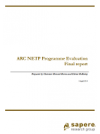This is the executive summary of a report by Sapere Research Group. It presents the results of a comprehensive evaluation of an Aged Residential Care (ARC) Nurse Entry to Practice (NETP) programme pilot commissioned by Health Workforce New Zealand and the Office of the Chief Nurse, Ministry of Health. Seven district health boards (DHBs), 11 ARC facilities and 15 registered nurse graduates participated in the 2013 ARC NETP programme pilot which was implemented by each participating DHB.
Purpose
The ARC NETP programme pilot was evaluated to:
- Identify the outcomes of providing enhanced support to 15 new graduate nurses working in the 11 ARC facilities in their first year of practice.
- Evaluate the success of providing additional financial support to ARC facilities when they employ a new graduate registered nurse.
- Compare the experience of new graduate registered nurses engaged with the ARC NETP programme with new graduate registered nurses in the DHB NETP programmes.
Methodology
The evaluation used a mixed methods approach and had two distinct phases. First a preliminary formative evaluation to identify how the NETP programme had worked initially and up to the mid-point, and second, a final evaluation focusing on outcomes.
DHB NETP programme coordinators, ARC facility managers, RN graduates and preceptors were surveyed at the mid-point of the programme pilot and interviewed leading up to the conclusion of the pilot programme. A request for financial data was made to ARC facility managers to determine how funding from the ARC NETP programme pilot was used.
DHB NETP programme preceptors and RN graduates in the seven DHB NETP programmes were surveyed to compare experiences of those working in public hospital, primary care and ARC settings.
The Nursing Council of New Zealand, New Zealand Nurses Organisation and the College of Nurses Aotearoa were also interviewed to gain their perspectives on the future development of the ARC NETP programme and its contribution to the profession, employment and education.
The relationship between findings from interviews, surveys and financial data has been analysed alongside the limitations of the evaluation. Future recommendations were formulated on this basis.
Key Results
Outcomes of providing enhanced support to RN graduates in ARC
Overall the evaluation found mixed outcomes for RN graduates across the 11 ARC facilities, which were strongly correlated to how well the programme was run, including the quality of preceptorship and the interest of the RN graduate to work in ARC. Almost three-quarters of the RN graduates in the ARC NETP programme pilot were not intentionally seeking a placement in ARC. Despite a low initial interest in ARC, most but not all RN graduates reported they benefited from the ARC NETP programme pilot.
The ARC NETP programme pilot was embedded within existing DHB NETP programmes. DHBs did not make changes to their NETP programmes in response to the pilot.
Most DHBs had made little change to the content of their NETP programme when initially including ARC other than two DHBs that had tailored the content specific to ARC.
The late start of the pilot in December 2012 lead to difficulties and differences in recruitment and time delays for some RN graduates in starting the NETP programme pilot.
The Advanced Choice of Employment (ACE) recruitment process for the DHB NETP was complete by December 2012 and was then not used effectively to select RN graduates for the ARC programme pilot that had identified ARC as a placement preference.
There was a high level of variation in the implementation of the ARC NETP programme pilot by DHBs and ARC facilities. Variation could be attributed to multiple factors including:
- Differences in contracts or letters of agreement held between a DHB and an ARC facility for the delivery of the ARC NETP programme pilot
- Relevance of study days and academic requirements applicable to the ARC setting
- Recruitment and selection of RN graduates with varying levels of interest in working in ARC
- Quality of orientation
- Choice of preceptor and the standard of preceptorship
- The level of engagement and role of the DHB NETP Coordinator
- Extent to which a DHB and ARC facility had previously provided ARC placements within a NETP programme.
- Seven RN graduates in the ARC NETP programme pilot specifically contributed to wider quality initiatives within ARC facilities.
- This included establishing a RN reflective practice group within the ARC facility, presenting to colleagues following an ARC NETP study day and making suggestions for improvements in practice.
- Involvement of ARC facilities in the ARC NETP programme pilot also resulted in one facility changing its model of care and another establishing a Professional Development and Recognition Pathway (PDRP).
- The retention rate at the conclusion of the ARC NETP programme pilot was 64%. Most RN graduates remaining in employment in ARC indicated they would be seeking alternative employment within the next 6-12 months in a bid to broaden their experience by working in a medical or surgical public hospital setting. Those RN graduates who had previously indicated a preference to work in ARC or Assessment Treatment and Rehabilitation remained in employment and intended staying.

